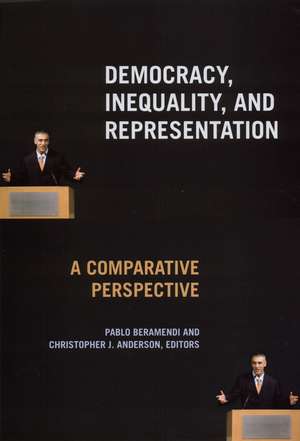Democracy, Inequality, and Representation in Comparative Perspective
Editat de Pablo Beramendi, Christopher J. Andersonen Limba Engleză Paperback – 31 aug 2011
The gap between the richest and poorest Americans has grown steadily over the last thirty years, and economic inequality is on the rise in many other industrialized democracies as well. But the magnitude and pace of the increase differs dramatically across nations. A country's political system and its institutions play a critical role in determining levels of inequality in a society. Democracy, Inequality, and Representation argues that the reverse is also true—inequality itself shapes political systems and institutions in powerful and often overlooked ways. In Democracy, Inequality, and Representation, distinguished political scientists and economists use a set of international databases to examine the political causes and consequences of income inequality. The volume opens with an examination of how differing systems of political representation contribute to cross-national variations in levels of inequality. Torben Iverson and David Soskice calculate that taxes and income transfers help reduce the poverty rate in Sweden by over 80 percent, while the comparable figure for the United States is only 13 percent. Noting that traditional economic models fail to account for this striking discrepancy, the authors show how variations in electoral systems lead to very different outcomes. But political causes of disparity are only one part of the equation. The contributors also examine how inequality shapes the democratic process. Pablo Beramendi and Christopher Anderson show how disparity mutes political voices: at the individual level, citizens with the lowest incomes are the least likely to vote, while high levels of inequality in a society result in diminished electoral participation overall. Thomas Cusack, Iverson, and Philipp Rehm demonstrate that uncertainty in the economy changes voters' attitudes; the mere risk of losing one's job generates increased popular demand for income support policies almost as much as actual unemployment does. Ronald Rogowski and Duncan McRae illustrate how changes in levels of inequality can drive reforms in political institutions themselves. Increased demand for female labor participation during World War II led to greater equality between men and women, which in turn encouraged many European countries to extend voting rights to women for the first time. The contributors to this important new volume skillfully disentangle a series of complex relationships between economics and politics to show how inequality both shapes and is shaped by policy. Democracy, Inequality, and Representation provides deeply nuanced insight into why some democracies are able to curtail inequality—while others continue to witness a division that grows ever deeper.
Preț: 327.17 lei
Nou
Puncte Express: 491
Preț estimativ în valută:
62.60€ • 65.53$ • 52.11£
62.60€ • 65.53$ • 52.11£
Carte indisponibilă temporar
Doresc să fiu notificat când acest titlu va fi disponibil:
Se trimite...
Preluare comenzi: 021 569.72.76
Specificații
ISBN-13: 9780871543240
ISBN-10: 0871543249
Pagini: 448
Dimensiuni: 152 x 229 x 25 mm
Greutate: 0.54 kg
Editura: Russell Sage Foundation
Colecția Russell Sage Foundation
ISBN-10: 0871543249
Pagini: 448
Dimensiuni: 152 x 229 x 25 mm
Greutate: 0.54 kg
Editura: Russell Sage Foundation
Colecția Russell Sage Foundation
Notă biografică
PABLO BERAMENDI is assistant professor of political science at Duke University. CHRISTOPHER J. ANDERSON is professor of government at Cornell University. CONTRIBUTORS: Christopher J. Anderson, Pablo Beramendi, Andrea Brandolini, Thomas R. Cusack, Robert J. Franzese Jr., Jude C. Hays, Torben Iversen, Duncan C. McRae, Jonas Pontusson, Philipp Rehm, Ronald Rogowski, David Rueda, Lyle Scruggs, Timothy M. Smeeding, and David Soskice.
Cuprins
I. Table of Contents The Context 1. Income Inequality and Democratic Representation Pablo Beramendi and Christopher J. Anderson 2. Inequality Patterns in Western Democracies: Cross-Country Differences and Changes Over Time Andrea Brandolini and Timothy Smeeding 3. Social Rights, Welfare Generosity, and Inequality Lyle Scruggs How Democratic Politics Shapes Inequality 4. Electoral Institutions, Parties, and the Politics of Class: Explaining the Formation of Redistributive Coalitions Torben Iversen and David Soskice 5. Economic Institutions, Partisanship, and Inequality Pablo Beramendi and Thomas R. Cusack 6. Political Agency and Institutions: Explaining the Influence of Left Government and Corporatism on Inequality David Rueda How Inequality Shapes Democratic Politics 7. Economic Shocks, Inequality, and Popular Support for Redistribution Thomas R. Cusack, Torben Iversen, and Philipp Rehm 8. Inequality and Unemployment, Redistribution and Social Insurance, and Participation: A Theoretical Model and an Empirical System of Endogenous Equations Robert J. Franzese and Jude Hayes 9. Income, Inequality, and Electoral Participation Christopher J. Anderson and Pablo Beramendi 10. Inequality as a Source of Political Polarization: A Comparative Analysis of Twelve OECD Countries Jonas Pontusson and David Rueda 11. Inequality and Institutions: What Theory, History, and (Some) Data Tell Us Ronald Rogowski and Duncan R. McRae 12. Inequality and Democratic Representation: The Road Traveled and the Path Ahead Pablo Beramendi and Christopher J. Anderson
